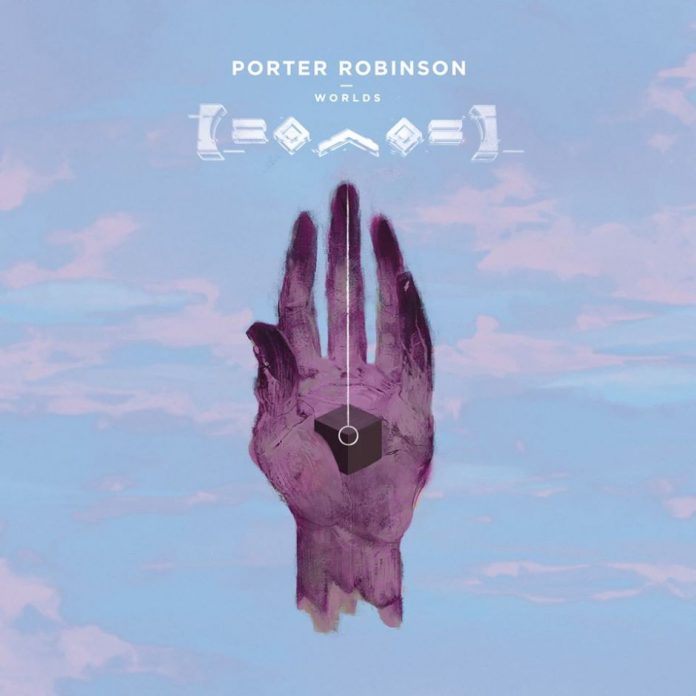Porter Robinson
Worlds Album Review
Astralwerks
Released August 12th, 2014
Genre: Alternative Dance, Synthpop, Downtempo, Indie Dance, Electro House
Coming off of a slew of #1 tracks on Beatport at the ripe age of 19, Porter Robinson began touring across the globe, bringing an electro sound that caught the attention of the EDM community. His tour took him to the biggest festivals and the biggest venues, while at the same time growing relationships with many fellow artists such as Zedd, Mat Zo, and The M Machine. All of these accomplishments resulted with many saying that he “conquered dance music.” But, amidst a drought of production, Porter announced via his Twitter account that he craves more from dance music .
In a string of bold tweets, Porter announced that he’s “had multiple anxiety attacks on stage this year and it was always related to feeling like a fraud. It sucked. The watershed moment in writing Worlds was when I realized that I didn’t have to write songs for DJs. I realized that my need to be honest with myself and with you was greater than my need to be famous or whatever.” This revelation lead to the release of the first single, “Sea Of Voices,” on SoundCloud, which crashed the popular internet music venue for several hours due to the immense amount of traffic on the site. The new M83-style of powerful transients and dramatic drums stunned listeners around the globe. Porter had verified himself as an artist, not as a DJ or a bedroom producer.
The album itself can be purely referred to as beautiful. Most of the tracks tend to lean toward a sound that is dominated mostly by gigantic synth layers, as well as dramatic, slow drums. The first track on the album, “Divinity (ft. Amy Millan),” manifests a drum-heavy, synth-driven sound that most had anticipated. The voice accompaniment and dreamy atmosphere creates a billowy wave of art that perfectly sets the tone for the remainder of the album. “Years of War (feat. Breanne Duren & Sean Caskey)” failed to impress anyone looking for a new synthesis of genres. The top-notch production and cute vocals mimicked the British group, CHVRCHES, which was a bit of a disappointment. I perfectly understand that Porter reached for a new sound that wasn’t commercial EDM, but I fully expected the gifted producer to generate a swifter and more cunning spin on the genre.
On the note of experimentation, “Flicker” flaunted the young producer’s ability to morph from an anime vocal line to an addicting, giddy wall of thick synthesizers and massive drum sounds. I urge the listener to not discount the track based solely the vocals, since I made that mistake the first time listening to it. This track is absolutely addicting and beautiful and will certainly pave the way for more types of experimental dance music for many years to come.
“Sad Machine” turned many heads upon its release because the sound was deep and heavy but still gorgeous in many aspects. Featuring a duet from Porter himself and a speech synthesis program, “Sad Machine” carries the listener through a story, woven by enticing sound design and dancing vocals. “Polygon Dust” features Lemaitre, a Norwegian duo specializing in the complex and bright French-Funk sound that has risen to main stages in the past few years. Their sound combined with Porter’s amounts to a track that is as dense as a moon rock. The track swaps from the thick synth line at the beginning, to a slow breakdown with the echoey vocals of Lemaitre, then goes back to the thick sound Porter has shown off throughout the album. “Hear The Bells (feat. Imaginary Cities)” added no substance to this already supersonic album. Mimicking a sound already practiced by M83, the Phoenix-like lyrics meow within a track that can be categorized into Indie-Dance effortlessly.
“Lionhearted (feat. Urban Cone)” has to be one of the best, if not the best, song on the album. It truly represents the bridge between the classic Porter Robinson sound and this new adventure the talent from North Carolina has embarked on. With its happy vocals and catchy melody, it truly brings the best of both worlds together, no pun intended. “Goodbye To A World” absolutely wowed me the first time I heard it. It slowly builds (much like “Sea Of Voices”) to artificial vocals that ultimately define the vocals on the album. The screaming synth line and classic dance beat furnish the album, showing that Porter possesses the ability to swap from style to style seamlessly.
In conclusion, Worlds is definitely one of the most noteworthy albums of 2014 thus far. What makes this album noteworthy is the fact that not many people were talking about it, and it serves as a stepping stone into what some call “Post-EDM.” It’s great for both Porter himself and EDM as a genre.






